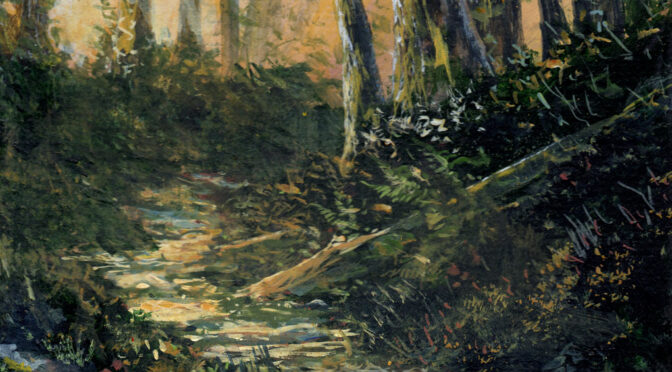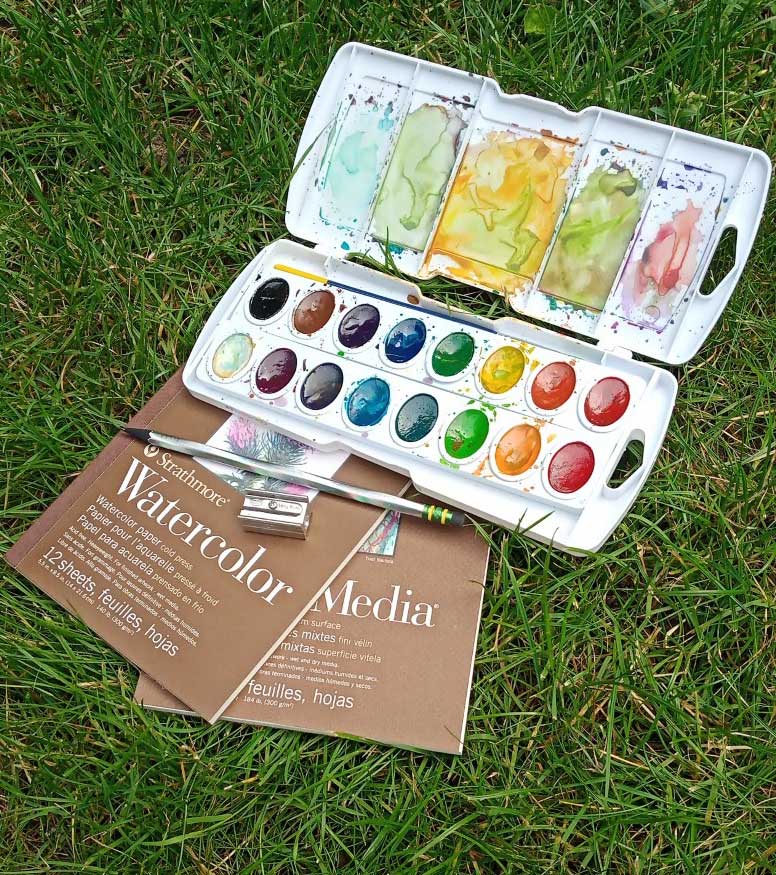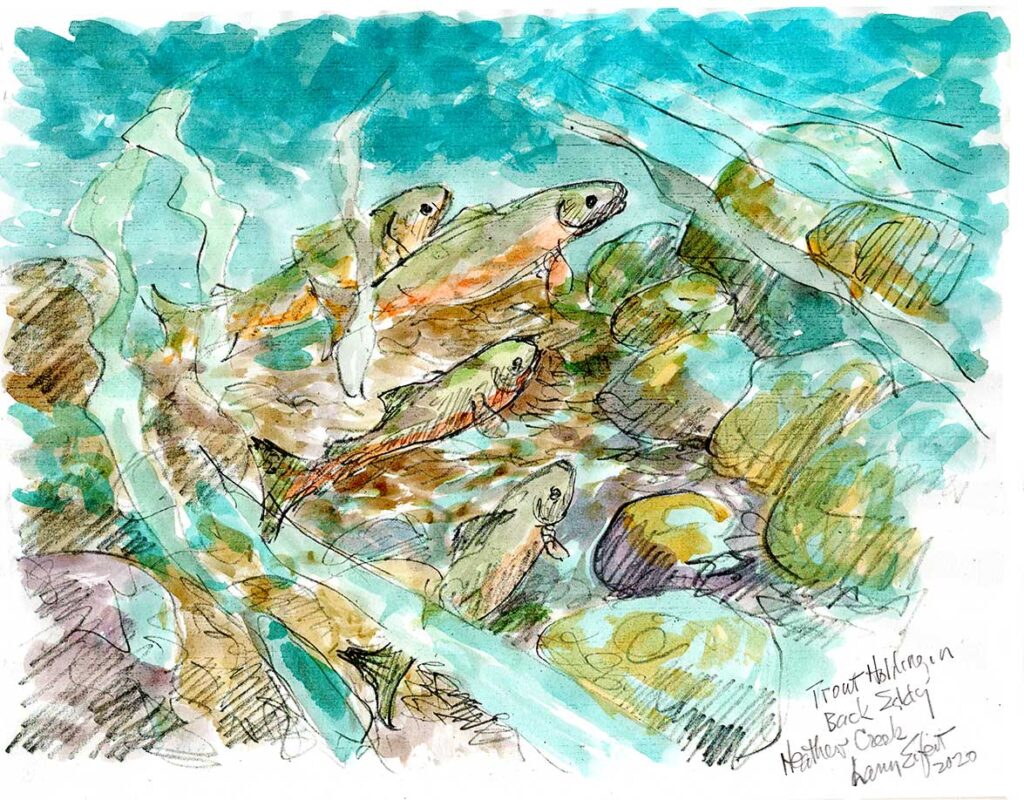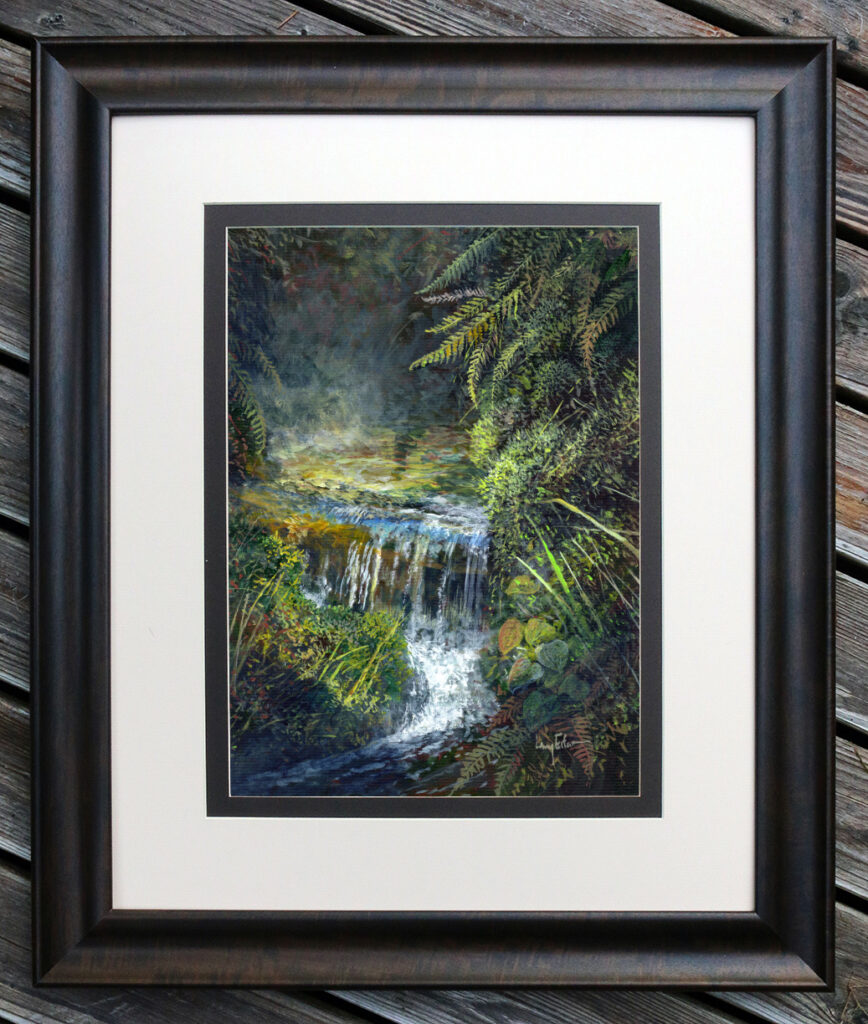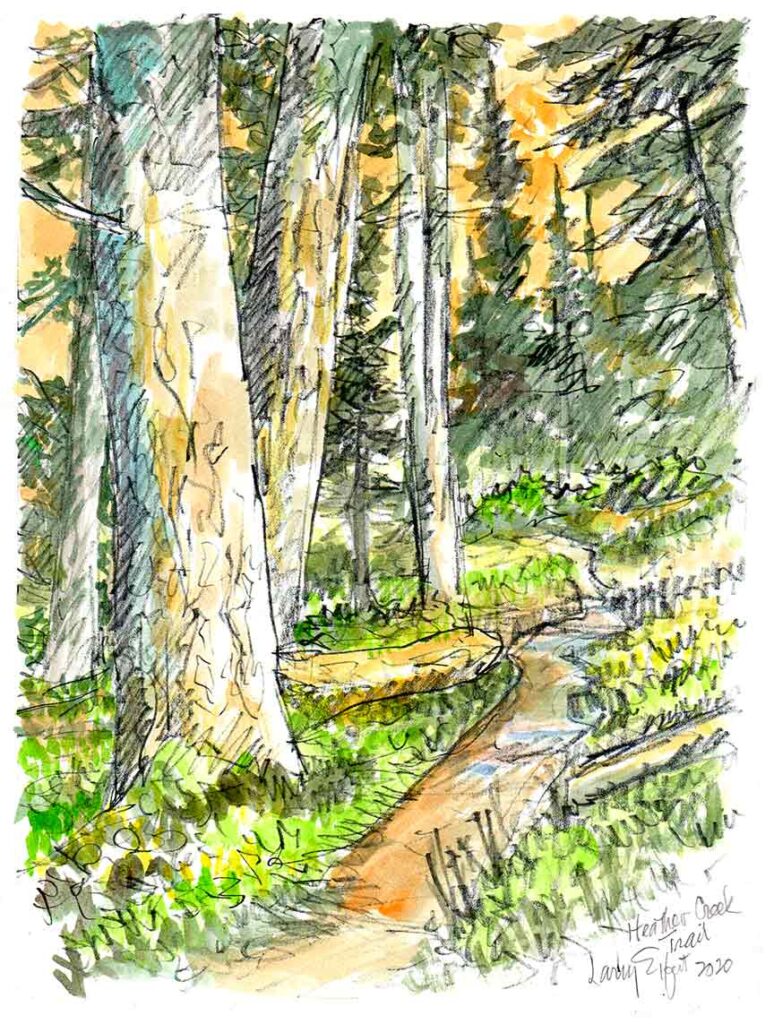
Making art on the trail – it’s my way of taking home some souvenirs. The very act of making art means I have to slow down, stop forward motion and actually see nature around me. I often pass hikers so intent on the trail coming up before them they don’t even see me standing beside there, watching them and wondering if they’ll even notice me. Some don’t! I suspect it’s the same for the deer and bears they pass too. I imagine them saying “many people come here looking, but there are so few actually seeing”.
I’m an older hiker now in my mid-70’s, but I’m still passionate about continuing this odd sort of primitive act of strapping a bag on my back and walking up a mountain. I’ve done it for a very long time now, and I never feel so close to life as I do out when I’m out there. It seems important, and I want to continue to do this as long as I’m able. So, some changes had to be made a few years ago – lighter equipment, a lighter me, a healthier lifestyle, regular exercise and being more careful how I walk. I’m now much more aware of being safe, and I’m facing the fact that just one stupid stumble and it might be the last step of trail I ever do. So I’ve slowed my pace, shorten goals and buy new boots more often. This means there are some new perks, like going slow enough to inspect how nature works, see the vibrancy of nature and how it goes on in the wild without us messing with it.
This is a cheap way to have fun.
Slowing down means I can make art while I’m out there, although I’ve always done this in some form – even when I was running down the trails. There are lots of ways to do this, and I fool around with several processes. One is to draw out the sketches while on the trail, refine them at home and add color there. That way I don’t have to carry the paints and mess with water or the sun, and it takes less time. Other trips I take the entire kit of paints, pencil, paper and sharpener and a brush, sit down in a meadow in the morning or evening after hiking, and paint with it all on my lap. This way I can match the colors I see instead of translating information from memory or photos later at home – or just making it up. It’s a more authentic painting, I think, to do it all on the spot.
Equipment: I really like, am almost passionate about, Noir black wood HB#2 pencils from Ticonderoga, and I carry a tiny little pencil sharpener called a “Long Point”. This little thing keeps the pencil sharper far longer than normal sharpeners, important when I’m in the flow of seeing and drawing.
While there are far better papers, the 5.5″ x 8.5″ 400 Series Strathmore Watercolor blocks ($5 for 12 sheets) are cheap, hold up well with scrubbing out goofs and provide a way to store finished paintings on the trail. Keep the paper small and paintings go quicker. Prang double set of watercolors ($11.50) provide a closed kit for hiking and yet opens to a nice set of paints opposite lots of mixing trays. It comes with a nice brush, big enough for wash work, small enough for details – and it stores in the pallet.
You don’t need more. For under $20, the entire painting kit weighs about 12 ounces and can be tucked into my pack, just waiting, tantalizing me, offering to make my hike a far better memory. It’s saying, “take me out, open me up”. Want proof, you’re reading this, aren’t you?
This is how I work
On a lunch break, I was standing beside a back eddy on Heather Creek. The stream was high and quick, running fast with a warm day’s runoff from the melting snows upslope. Suddenly, I noticed a flash in the water, then movement, then more. Half a dozen brook trout were holding in the back eddy, facing downstream. Occasionally, a fish would break rank, dart out into the opposite-flowing current and snatch up an insect floating by.
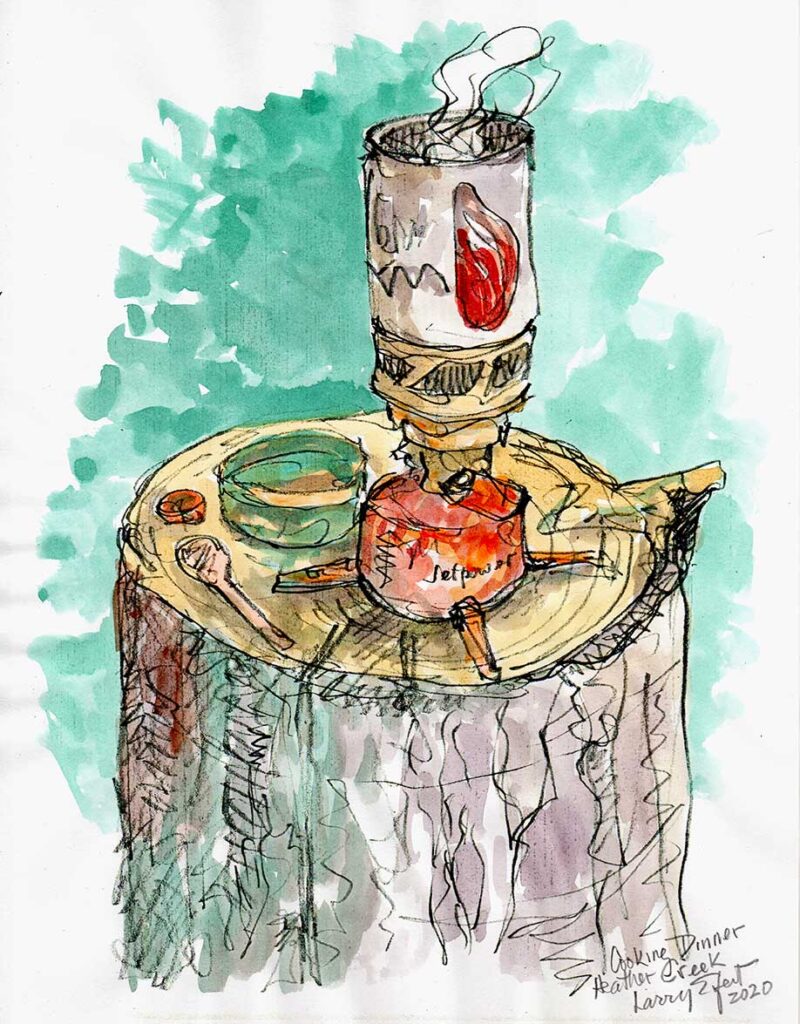
These fish were perfectly color matched with their rocky surroundings, and the slight reddish pectoral fin was all that gave them away. That fin, just behind the eye, the one that often lays flat so it shows from above was what told me which trout species I was seeing. That slight bit of warm red was only occasionally visible, or I’d have missed seeing them altogether. So, now here’s the best part of this experience. I did this piece of art standing right in front of them, and now, as I write this, I realized those fish are most likely still there, still going about their business in that bit of stream. I may be gone from there, but this bit of nature is probably not. I have a good memory, but it will always maintained by this painting of them. This gives me great satisfaction, some small token of this trip that I can conger up later to remember what I thought was a superior moment.
I was waiting for dinner
Like many solo hikers, I use a JetBoil stove that gives me a liter of boiling water in 100 seconds. It’s light, stores all its parts inside the pot, and I can have morning Starbucks coffee in one minute flat. Think of that! I started camping in a time when a wood fire was all I had, all anyone had to get a hot cup of coffee or a warm meal. It was a true ordeal, scratching up raw dirt for a fire pit so I wouldn’t burn the place down, scrounging around under bigger trees for small dry twigs and then bigger branches, finding dry duff for tinder – then hoping the darned thing actually started. I still makes fires occasionally, but the urgency in the past is past. Instead, I can paint a little picture of what I saw, the kitchen – or the open meadows before me, clouds breaking off the peaks above Royal Basin to the west. I used the two ancient Douglas-firs snags for the center of interest and two matching little firs just starting life for the foreground.
It may not seem apparent from these little watercolor paintings, but I’m really not that abstract all the time. I paint bigger stuff, I mean BIGGER stuff, often for the National Park Service for parks around the country.
I recently used my knowledge of the Olympic Mountains to paint 500 sq feet of murals for the Hoh Rain Forest Visitor Center, and the process wasn’t really much different than hiking up a trail and learning what the place looks like. Yes, it’s the same guy doing both the trail paintings and these huge wall paintings. Me.
Also for Olympic National Park, I’ve painted several large wall murals of the Elwha Dam deconstruction, the largest dam removal in US history. The murals showed how the river would look after nature heals and was used for community outreach in libraries, visitor centers and schools. These were painted using day hikes to gain references, and again it was the process of studying nature and then just putting it down on a huge canvas. To tell you the truth, while I like doing these big paintings – standing by a river and drawing fish in the back country is much more fun.
Finally, about the Tent
You can see my sketch pad in the foreground, in front of my camp, the tent set up for the evening. This is my routine, set it up, make water for the night with my filter down by the creek or lake, then settle in and make some art while there’s still light. Because I’m not carrying 40+ lbs any more, I can paint instead of licking my wounds. I feel good, and this tent is helping. It’s a Six Moon Designs Lunar Solo from a small company in the Portland, Oregon area. They sent me this to use, and my packed tent weight went from 6 lbs to 1 lb 10 ounces. It’s an amazing shelter, I think, that uses my single hiking stick as the pole. No tent poles means an even lighter tent.
This brings me back to how I started this story, about older people getting out, experiencing nature and bringing back memories. It’s a subtle hint that, if you like what I’m writing about here, you can do this too. Get some cheap or used gear to start, do some short hikes, sleep under the stars and find some real happiness in these strange times.
Go to the mountains, it will heal your soul.
Thanks for reading this week. You can sign up for emails for these posts on my website at larryeifert.com, down the right side of the home page.
Larry Eifert
Here’s my Facebook fan page. I post lots of other stuff there.
Click here to go to our main website – with jigsaw puzzles, prints, interpretive portfolios and lots of other stuff.
Nancy’s web portfolio of stunning photography and paintings
And here to go to Virginia Eifert’s website.
